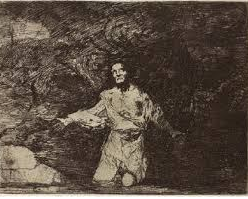Updike is the topic again at The Home of Schlemiel Theory: The Place Where the Laugh Laughs at the Laugh, and this time blogger Menachem Feuer writes “On Literary Pain: Comic and Tragic (From John Updike and Franz Kafka to Louis CK).”
 Feuer begins, “The feeling of pain (what Emmanuel Levinas calls ‘the little death’) and the existential onset of death are the most private experiences. It goes without saying that nobody can feel my pain or experience my death for me. . . . It can be argued that pain gives one a sense of selfhood. What narrative—as opposed to myth—can do is make the reader aware of pain and that all pain is not necessary. The innocent suffer. It can give us a view into the character’s private pain and contrast it to a public which cannot or refuses to see it. A thinker named Rene Girard argues that this perspective is what distinguishes monotheism from paganism.
Feuer begins, “The feeling of pain (what Emmanuel Levinas calls ‘the little death’) and the existential onset of death are the most private experiences. It goes without saying that nobody can feel my pain or experience my death for me. . . . It can be argued that pain gives one a sense of selfhood. What narrative—as opposed to myth—can do is make the reader aware of pain and that all pain is not necessary. The innocent suffer. It can give us a view into the character’s private pain and contrast it to a public which cannot or refuses to see it. A thinker named Rene Girard argues that this perspective is what distinguishes monotheism from paganism.
“It is plausible to argue that this perspective on pain is a key ingredient of modern literature. The more we can see the literary pain of a fictional character in contrast to his surroundings or people, the more valuable a piece of literature can be for us. It can help us to understand the relationship of pain to selfhood and the world. However, there is another side to this coin. This perspective is tragic, not comic. Comedy isn’t interested in pain so much as in what Freud would call the release of tension (for Freud the psyche feels pleasure when it releases such tension). In modern literature, we also experience such a release from pain. It may not be complete, but its release does make things better. It may not be as deep but it means a lot to us. When we laugh at ourselves, we can live better. (To put it simply: pain is heavy; comedy is light.)
“John Updike . . . tends more toward a fiction that is about pain and sharing that pain as a kind of secret with his audience. I find his theology of pain interesting. His obsession with pain is affected by his belief that suffering has a religious quality (perhaps in a sense similar to Kierkegaard). In his novel, The Centaur, he takes a Kafkaesque premise (of a human turning into a creature) but instead of having the character turn into a bug he has the main character turn into a centaur. And instead of having this happen in the privacy of the home and within the space of the family, Updike has it happen in the midst of the public sphere (in front of a class). The subject is—immediately—a kind of Christ figure who is publicly ridiculed when he ‘turns.'”
Feuer posits, “Updike is telling his reader about how significant private pain is and how the inability to feel one’s own pain—as a result of humiliation—marks the ‘crush(ing)’ of selfhood. Updike’s close descriptions of the pain suggest that it is not merely a private affair. Its description takes on a kind of religious aura. . . .”
